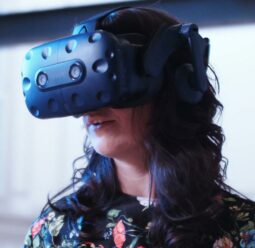As Australia races to retrofit laws for generative artificial intelligence, the nation's eSafety commissioner says investigators face real-life harms every day.
Raptor dinosaurs were previously thought to be the size of a human but the discovery of a new footprint reveals it is substantially bigger.
Fitness gadgets that track your vital signs could be powered by sweat in the future after a research into nanogenerators by Australian universities.
Queensland scientists have created a way to produce electricity using carbon dioxide in a development they say could power phones and computers.
Dinosaur-fans rejoice! A nearly complete pterosaur fossil has been unearthed in regional Queensland.
Women are increasingly being recognised for their success in the agricultural sector in production, biosecurity, science and as champions of future farmers.
A huge satellite powered by flexible, printed solar cells developed by the CSIRO has launched in the US and may help keep others in space.
Around one in six Australians has some form of hearing loss, ranging from mild to complete hearing loss.
A new report recommends changes to support more diversity in science, engineering and technology jobs, as the industry fails to embrace change.
According to Greek mythology, Zeus punished Prometheus for giving fire to humans. He chained Prometheus up and set an eagle to feast on his liver. Each night, the liver grew back and each day, the eagle returned for his feast. In reality, can a liver really grow back?
A University of Queensland study sheds light on the oral health divide in Queensland, pointing to a lack of fluoridated water in less affluent areas as a key factor.
The perils of ultra-processed foods received widespread coverage in recent months – thanks in no small part to the publication and promotion of TV presenter and doctor of virology Chris Van Tulleken’s book Ultra-Processed People.
While researchers have known since the 1960s that some coral were present off the Atlantic, the reef's size remained a mystery until now.
El Nino and other factors make extreme weather events more difficult to predict, say scholars following scrutiny in the wake of destructive floods and storms.
While running air conditioning briefly and intermittently at a very cool temperature may feel thrifty, it won’t be the most energy efficient choice. Here’s what to do instead.
Spend some time scrolling social media and you’re all-but-guaranteed to see an ad promising to help you with targeted fat loss. These ads promote a concept known as “spot reduction”, claiming you can burn fat in a specific body area, usually the belly, with specially designed exercises or workouts.
But can you actually target areas to lose fat?
A trio of scientists who discovered nanoparticles and quantum dots used in LED-lights, TV-screens and cancer surgery have won the Nobel prize for chemistry.
For more than 30 years, climate researchers have puzzled over the link between human-caused climate change and El Niño and La Niña events. New research is shedding light on what might be happening.
Thousands of eclipse chasers from across the globe are set to witness a rare total solar eclipse as the sun vanishes from the sky in the remote Ningaloo region.
Thousands of people travelled from around the globe to witness a rare total solar eclipse as the moon cast a 40km-wide shadow over the sun for 60 seconds.
Analysis of Australia's first near-complete sauropod dinosaur skull has revealed new details of the animal's anatomy, relationships and feeding habits.
People can travel to pre-colonial Brisbane and explore its Indigenous cultural heritage in a virtual step back in time at the World Science Festival.
A world-first surgical technique performed by an Australian surgeon using a groundbreaking Australian-Singaporean 3D implant has produced a jaw-dropping result.
Case numbers of COVID have fallen significantly across the nation as new treatments provide hope in the fight against the deadly virus.
A space voyager known as the Green Comet is now visible from Australia, 50,000 years after its last earth encounter in the time of the Neanderthals.
Aussie grains could feed the world in new products as consumers and food companies look for safe, affordable and low-emission alternatives to animal proteins.
There are better matches to modern-day wombats than the car-sized Diprotodon, and a skull found in a Queensland cave reveals more about their lives.
If you're an amateur astronomer living in Queensland, there are many exciting things to look out for in the night sky in 2023. Here are a few highlights to add to your observing calendar...
Scientists are trying to work out if a bacteria linked to dementia gets into human brains through the nose, like it does in mice.
A decision by Queensland's forensics lab not to test certain DNA samples as thoroughly as possible saved less than $1 million a year, a hearing has been told.
A PhD student from the University of Southern Queensland is developing an affordable wound dressing made from plum peel, aloe vera and sticky gum.
 abusive behaviour
banking
children
computing and information technology
consumers
economy, business and finance
human rights
insurance
investments
politics
professional - women general
science (general)
technology (general)
abusive behaviour
banking
children
computing and information technology
consumers
economy, business and finance
human rights
insurance
investments
politics
professional - women general
science (general)
technology (general)




























